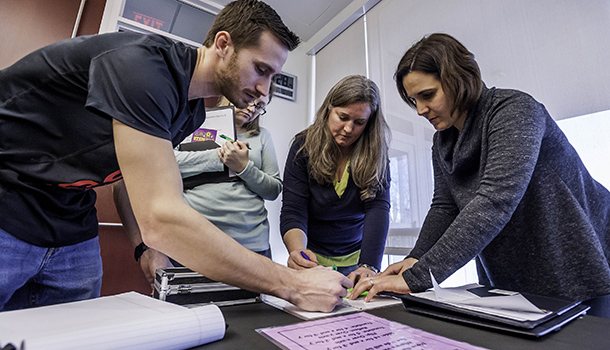
(Photo Credit: CODNewsroom/Flickr)
Starting next year, students in the Central Valley will have a chance to earn college credit using knowledge they’ve gained through life experiences including work and military service. This will help students obtain their degrees or certificates in a more timely and cost-effective manner.
The West Hills Community College District (WHCCD) aims to implement the new prior learning assessment program, Quick Path, in fall of 2018 funded by a $2 million California Innovation Award for Higher Education from the state.
“Prior learning assessment is a way to open the doors of a community college to bring the students who may have the skills or the training from a non-traditional source,” said Linda Thomas, vice chancellor of educational services & workforce development for WHCCD.
The program will benefit students who have work experience, but need a certificate or degree to advance in their career. As an example Thomas added, “For us to look and say, ‘Hey you’ve demonstrated to us that you can do everything in Accounting I and you don’t have to take it because you’ve already shown us that you know it.’ So, we’ll give you credit for that and move you into Accounting II.”
The Quick Path pilot will take place at three campuses including West Hills College Coalinga, West Hills College Lemoore and San Joaquin Delta College. WHCCD has partnered with Council for Adult and Experiential Learning (CAEL), a nonprofit leader in prior learning assessment, and Academy One, which will create the online platform. The pilot will also include a program assessment component to ensure that it is scalable and portable. The goal is to expand to all of the region’s community colleges and ultimately to all the colleges in the state.
According to Thomas, the pilot will help have a big impact on students who have work experience in a trade, but need a certificate to get promoted or a pay raise. “I’ve talked to a lot of CTE instructors who say, ‘Gosh, this guy’s got to take Welding I and honestly, he could be teaching it.’ This solves the problems that a lot of CTE instructors have had because people come from industry with skills and they just need the credentials.”
“This is exactly the type of creative program that can help strengthen our workforce,” said Van Ton-Quinlivan, vice chancellor for workforce and economic development in the California Community College’s Chancellor’s Office. “People getting academic credit for real world skills from their experience in the workforce will attract more workers to the community colleges so they can sharpen their work skills and better compete for the jobs of the 21st century.”
To earn credit, students will submit an online portfolio that demonstrates their knowledge of the subject. It will be reviewed by a faculty panel who will determine if the artifacts submitted by the students satisfy the course requirements.
The pilot will not only benefit the students, but the region as well, according to WHCCD Chancellor Stuart Van Horn. “By instituting the prior learning assessment pilot, prospective students who have knowledge, skills and real-lived experience evidence will have a path to obtain their degrees or certificates in a more timely and cost-effective way. This will allow them to advance in their careers and strengthen the region’s workforce in the Central Valley.”
“That’s what working people want and need,” added Thomas. “The idea of taking a two-year program to get their associate’s degree, if their classes are available, is daunting. But if someone comes to this situation and doesn’t have to take certain classes, then that knocks a semester off of their work and they’re more likely to think about doing it.”

